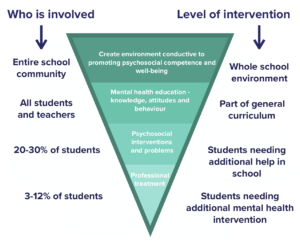Can schools help alleviate mental health concerns?
A new report from the O’Brien Institute for Public Health, prepared for Children First Canada, raises concerns about Canada’s lack of progress in addressing serious mental health problems among children and young people.
Between 2007 and 2017, there was an increase of more than 50% in the number of Canadian children and young people (5 to 24 years-old) who were hospitalized or taken to emergency rooms for mental health concerns, and Canada’s teenage suicide rate is the fifth highest among OECD countries. In 2016, 22% of Canadian teenagers reported they had considered suicide. According to the report“…it is time for the investment in children, and the structures that nurture and support them, to become a higher priority for Canada.”
Change needed
The report points to the multiple factors that have an impact on young peoples’ mental health and well-being, including poverty, education, food insecurity, child abuse, and bullying. It says that Canada needs better and more consistent ways to collect data on children and youth, including demographic data, so that effective policies can be developed. The authors also point to an Angus Reid poll in which 87% of participants said that while investing in children costs more in the short-term, it saves much, much more in the long-term.
Is comprehensive school health a part of the solution?
Researchers and health experts, including the World Health Organization, are united in their view that schools – where children and youth spend much of their time – are the ideal place to both promote mental health and to provide support and interventions that can alleviate, or even prevent, many forms of mental illness.

In a study focused on health competencies, prepared for People for Education, authors Bruce Ferguson and Keith Power point out that the majority of mental health disorders emerge during childhood and adolescence. For this reason, prevention and early effective treatment have long-term payoffs for individuals and society.
…successful school-based mental health promotion holds the promise of reducing short and long-term distress to individuals and costs to society. (Ferguson, B. & Power, K.)
While schools can play a key role in supporting student mental health, principals responding to our 2018 annual school survey reported that existing mental health resources such as social workers, psychologists, and guidance counselors, are insufficient to meet students’ needs, and that mental health issues are taking up an increasing amount of their time and resources.
